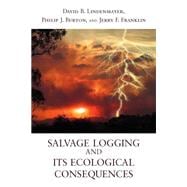
| Preface | |
| The Challenge of Large-scale Natural Disturbances and Salvage Logging | |
| Natural Disturbance of Forest Ecosystems | |
| The Effects of Salvage Logging on Ecological Phenomena | |
| Case Studies of Salvage Logging and Its Ecological Impacts | |
| Limiting Salvage Logging Impacts | |
| Toward Better Management of Naturally Disturbed Forests | |
| Table of Contents provided by Publisher. All Rights Reserved. |
The New copy of this book will include any supplemental materials advertised. Please check the title of the book to determine if it should include any access cards, study guides, lab manuals, CDs, etc.
The Used, Rental and eBook copies of this book are not guaranteed to include any supplemental materials. Typically, only the book itself is included. This is true even if the title states it includes any access cards, study guides, lab manuals, CDs, etc.